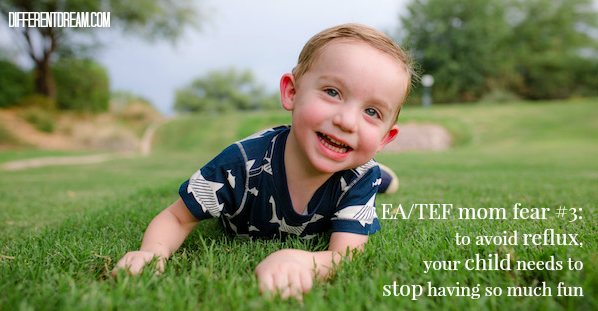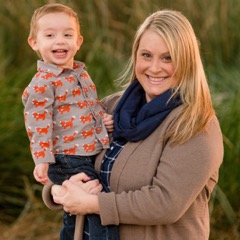My 4 Greatest EA/TEF Mom Fears

EA/TEF Mom fears are on today’s EA/TEF Awareness Month menu. They’re being served up by guest blogger, Jill Seaney whose little boy is now three. In today’s post she describes her top four EA/TEF Mom fears. Her worries will be all to familiar to other EA/TEF parents and perhaps unbelievable to those just learning about the condition.
My 4 Greatest EA/TEF Mom Fears
Being a parent can be scary! Parents worry about things like babies sleeping through the night, toddlers eating their veggies, or how their child will do in school. These are all real and valid worries.
But what if your child was born with complex medical problems? My son, Blake, who is now 3.5 years old, was born with multiple birth defects, the most serious of them at birth was esophageal atresia and a tracheoesophageal fistula (EA/TEF) which required major repair surgery when he was 3 days old. He is now “fixed” in the sense that his surgery was successfully completed— his esophagus was connected to his stomach and his trachea and esophagus were separated. However, he will never be “cured” and will have struggles related to this birth defect for the rest of his life. Below are my four biggest EA/TEF Mom fears.
- The common cold or flu manifesting into something much worse. All kids born with EA/TEF have a medical condition called tracheomalacia (TM), a collapse of the airway when breathing. When a person with TM exhales, the airway collapses partially or even all the way in really severe cases. The airway is floppy and it makes it much more difficult to have a productive cough that gets bacteria and junk up and out of the airway. Instead, it sits in the airway and can turn into a bad respiratory infection, often times pneumonia. A child with a common cold is usually better within 10 days. For a child born with EA/TEF the common cold can quickly and easily turn into a hospitalization for pneumonia. As soon as the weather starts cooling down, usually right after the holidays here in Arizona, we go into “hibernation mode” in order to prevent sickness as much as possible.
- Eating. Especially in public. Most kids born with EA/TEF have a narrower than normal esophagus due to connection surgery at birth. Often times, food gets stuck in the narrow part of the esophagus. The only way to unclog the esophagus is to get the food to go down to the stomach or get it to come back up (vomiting). As my son gets older we can get the food unstuck by giving him soda or pineapple juice. But typically he vomits more quickly than normal to bring it back up. He turns reddish-blue and makes a loud noise as the food comes back up and out his mouth. When we eat in public I cut his food into teeny, tiny bites and tell him to chew, chew, chew. I also encourage small sips of soda to prevent what EA/TEF parents call “stuckies”. The stares from bystanders are tough some days, but mostly I worry about how children eating at the table with him will respond in a couple years when he goes to school. I worry about his heart being broken if kids make fun of him.
- Damage to the esophagus from reflux and long term effects of medications taken for reducing acid. Most people with EA/TEF have acid reflux. Blake has been on high doses of two acid reflux meds since birth. His doctor says the reflux will not likely ever go away. All we can do is keep medicating him to reduce the amounts of acid so it doesn’t do as much esophageal damage when he does reflux. Reflux is awful to watch. Blake refluxes the worst when he laughs or cries too hard, or when he falls asleep and is totally relaxed. I have to tell my 3-year-old is to calm down when he starts having too much fun. I know that he is likely going to reflux, and stomach contents will shoot up and out his mouth and nose. It will end with him crying because it hurts so badly. I fear social settings with other young kids when he gets excited or laughs too hard. What if reflux shoots out his mouth and nose in front of them? We keep him on high doses of medications to reduce acid in the stomach to protect his esophagus. But at the same time, I worry about long term side affects from the medications.
- Ongoing narrowing of the esophagus and esophageal dilations. Kids who are born with EA/TEF often times have stricturing (narrowing) of the esophagus. The narrowing can get so tight a dilation’s needed to open the esophagus so food can go down without getting clogged up. The dilation is done under anesthesia. The surgeon inserts a deflated balloon into the esophagus and then inflates the balloon to lightly push open the stricture again. The dilation can work for years but might have to be repeated throughout childhood and into adult life. My son has had four dilations so far. It’s hard to watch him go through dilation after dilation. When food starts getting stuck more frequently, my worry and fear is that the stricture is narrowing and will need another dilation. We also worry about an esophageal perforation or other complication with more dilations and manipulations. Our son has to be intubated to protect his floppy airway which one time resulted in a paralyzed vocal chord. That makes him more susceptible to food aspirations and aspiration pneumonia now.
Like all moms, I worry about normal stuff. But I have an extra long list of out-of-the-ordinary fears and worries as well. I hope these examples help other EA/TEF parents know that they are not alone in these fears. I hope they shed some light about typical fears of an EA/TEF parent to those unfamiliar with the condition before the start of Awareness Month!
Do you like what you see at DifferentDream.com? You can receive more great content by subscribing to the quarterly Different Dream newsletter and signing up for the daily RSS feed delivered to your email inbox. You can sign up for the first in the pop up box and the second at the bottom of this page.

By Jill Seaney
Jill lives in Tucson, AZ with her husband Jeff and their son Blake. She worked in Human Resources up until 2014 when her son was born with VACTERL Syndrome which included EA/TEF. Jill resigned to care for her son full time. Later he was also diagnosed with a Congenital Diaphragmatic Hernia and Eosinophilic Esophagitis. Jill’s personal blog (Beloved Blake) documents his surgeries and health challenges, their family struggles, and Blake’s milestones. Jill loves writing and teaching others about what it’s like raising a child with complex medical needs. She wants to be a blessing to other parents just starting on this journey.
6 Comments
Trackbacks/Pingbacks
- Wisdom Shared by EA/TEF Parents: 9 Years of Stories and Strategies | Different Dream Living - […] in 2017, Jill Seaney shared her 4 greatest mom fears as a parent. Her post resonated with readers then,…
Submit a Comment
Subscribe for Updates from Jolene
Related Posts
PTSD, Stress and Moving On as Special Needs Parents, Pt 8
Moving on as special needs parents can be hard. Dr. Liz Matheis offers suggestions about how to make it easier for parents and children alike.
Finding Balance in Special Needs Parenting and Stress, Pt. 7
Finding balance in special needs parenting and stress is a tricky proposition. That’s the question answered in this post in the series about PTSD and stress.
Address Your Stress
When traumatic memories of caring for a child with special needs rule your thoughts, it’s time for parents to address their stress following these 6 steps.






That darn reflux. Yes, every year does get easier! I’m so glad the pandemic gave your daughter time to thrive!
Thank you for sharing. You put our similar story into words so well. Our daughter had type C TEF/EA, coarctation of her aorta, congenital hip dysplasia, and coloboma with her right eye. She is now 10yo and doing quite well. Last hospitalization for pneumonia was 2020 right before the Covid shutdown. Keeping her quarantined was the best bc it gave her two illness-free years to grow and thrive. I remember one time when she was 2 she laughed too hard bc we were tickling her, she almost went unconscious from reflux coming up out of her nose and her trachea collapsing. Each year gets easier. ☺️
Thank you for sharing Lindsay! That’s a lot to control all together and I can imagine it can be quite overwhelming! My son also has food allergies (EoE) so we have had to eliminate a ton from his diet! Definitely not easy! I understand your frustrations with food all too well! We are definitely their best advocates!!! I think one of the more difficult aspects of EA/TEF kids are that they are all SO different. Each case and each kid are so different in how it affects them! Hang in there mama!
Thank you for sharing your story. My TEF child son. 14 he hasn’t had very many dilations but last year he had a couple. He hit puberty out grew his surgery started having trouble breathing. Passed out at school needed oxygen. Dilation helped him. He was recently diagnosed with type 1 diabetes. TEF plus food allergies makes handling diabetes differently this is my fear I’m trying to learn this. It’s upsetting because I know we parents have to be their advocates a lot of Dr seem to have very little understanding of TEF how this changes things for my son.
Thank you Carol! Congratulations on the new baby in your family! There are definitely a lot of worries and difficult circumstances with EA/TEF kids, but you know what, they are the strongest and the most resilient kids! Looking at my son, you would never know all he’s been through! Moms and Grandparents worry a lot more than the kids do 😉
Jill, thank you for the detailed description of some of your worries concerning your sweet son. I am a Grandma new to EA/TEF since my grandson was born on 12.8.17. It is helpful to know want the future may hold and ways to deal with it. May you, your husband and your son be blessed in many ways.